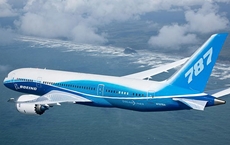Boeing halts 787 deliveries, but production to go on
19 Jan 2013
Boeing Co on Friday halted deliveries of its 787 Dreamliner until the US Federal Aviation Administration approved and implemented a plan to ensure the safety of potentially flammable lithium-ion batteries.
 "We will not deliver 787s until the FAA approves a means of compliance with their recent Airworthiness Directive concerning batteries and the approved approach has been implemented," a Boeing spokesman said.
"We will not deliver 787s until the FAA approves a means of compliance with their recent Airworthiness Directive concerning batteries and the approved approach has been implemented," a Boeing spokesman said.
The announcement capped a week in which all fifty 787s in service around the world were grounded on orders from multiple aviation authorities, including India's Directorate General of Civil Aviation, to investigate the cause of two incidents, including a fire, linked to the batteries.
Boeing said it would continue building the carbon-composite 787. The plane is assembled in Everett, Wash, and North Charleston, SC out of pieces built all over the world.
Officials from the Federal Aviation Administration (FAA), US National Transportation Safety Board (NTSB) and Boeing joined Japanese authorities looking into what caused warning lights to go off this week on an All Nippon Airways Co domestic flight, prompting the aircraft to make an emergency landing at Takamatsu airport in western Japan.
The jet has been flying safely for 15 months, carrying more than 1 million passengers, but it has run into problems in recent weeks, including problems with fuel leaks.
The biggest safety concerns centred on its lithium-ion batteries, which are lighter than conventional batteries, pack more energy and are faster to recharge, but are also potentially flammable.
When the FAA announced the grounding of all six US-operated 787s on Wednesday, the agency said airlines would have to show the batteries were safe and in compliance with its rules. It said both battery failures released flammable chemicals, heat damage and smoke - all of which could damage critical systems on the plane and spark a fire in the electrical compartment.
Boeing's chairman and chief executive Jim McNerney in a statement to employees defended his company and the aircraft against "the negative news attention over the past several days."
"As everyone inside the company knows, nothing is more important to us than the safety of the passengers, pilots and crew members who fly aboard Boeing commercial and military aircraft," he said.
"We have high confidence in the safety of the 787 and stand squarely behind its integrity as the newest addition to our product family."
The problems have cast a cloud over the aircraft heavily dependent on pioneering electrical systems and lightweight composite materials that is meant to be Boeing's future.



















